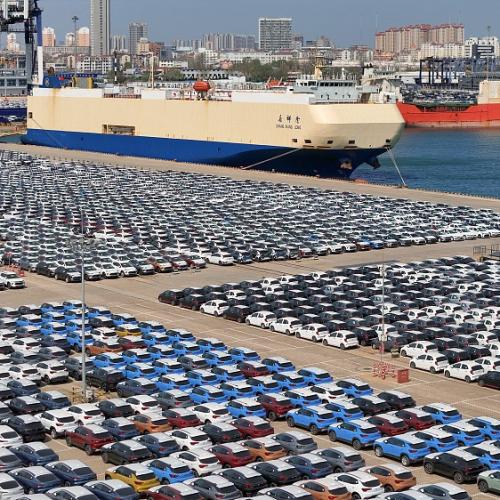



China's foreign trade will sustain its upward trajectory in the second quarter, remaining on a path of growth throughout the first half of the year, government officials said on Friday.
They explained that the country's trade advancements are supported by a solid industrial base, enhanced innovation capabilities, various free trade agreements and the tangible growth of the Belt and Road Initiative.
China's foreign trade grew by 5 percent year-on-year to 10.17 trillion yuan ($1.41 trillion) in the first quarter, according to data released on Friday by the General Administration of Customs.
Speaking at a news conference in Beijing, Wang Lingjun, vice-minister of the GAC, said that at present, the global landscape is experiencing significant shifts, and the world economy faces numerous formidable challenges which are likely to test China's foreign trade capabilities extensively.
It is crucial to recognize that the nation's foreign trade now enjoys more entrenched competitive advantages, ensuring a strong foundation for the continued improvement of both imports and exports, said Wang.
China's foreign trade volume between January and March surpassed 10 trillion yuan for the first time compared with the same period in previous years, with its growth rate hitting a six-quarter high.
As China's factory activities have accelerated more quickly than expected, Goldman Sachs Group Inc raised its forecast for China's economic growth to 5 percent in 2024, aligning with the target set by the Chinese government, rather than the 4.8 percent previously predicted.
To mitigate the risks posed by sluggish global economic growth and rising geopolitical tensions, China's primary objective is to cultivate new engines for foreign trade in the long run, such as exporting tech-intensive green products and expanding cross-border e-commerce business, said Zhou Nianli, a professor specializing in foreign trade at the University of International Business and Economics in Beijing.
Increasing the trade volume of intermediate goods and bolstering trade digitization are also top priorities, said Zhou.
Similar views were expressed by Lyu Daliang, director of the GAC's statistics and analysis department. "These efforts are not just about maintaining market share, but about exploring new paths for growth in foreign trade. This includes utilizing new technologies and leveraging free trade rules to stimulate the growth of foreign trade."
In addition to their participation in several global trade shows later this year, including the Textile Expo Barcelona in Spain and Automechanika Frankfurt in Germany, exporters from Ningbo in East China's Zhejiang province have set a new record by booking over 4,000 booths for the upcoming 135th session of the China Import and Export Fair (Canton Fair) in Guangzhou, Guangdong province, according to information released by the city's commerce bureau.
Yueli Group Co, Ltd, a Ningbo, Zhejiang province-based home appliances manufacturer, saw its exports of ironing products soar more than 30 percent year-on-year in the first quarter of this year, and foreign trade orders have now been scheduled until June.
To seize more market share, Lu Ping, the company's chief financial officer, said the company introduced a type of mini electric iron product in overseas markets last year, which quickly gained popularity in countries like Germany and Sweden.
If you have any problems with this article, please contact us at app@chinadaily.com.cn and we'll immediately get back to you.